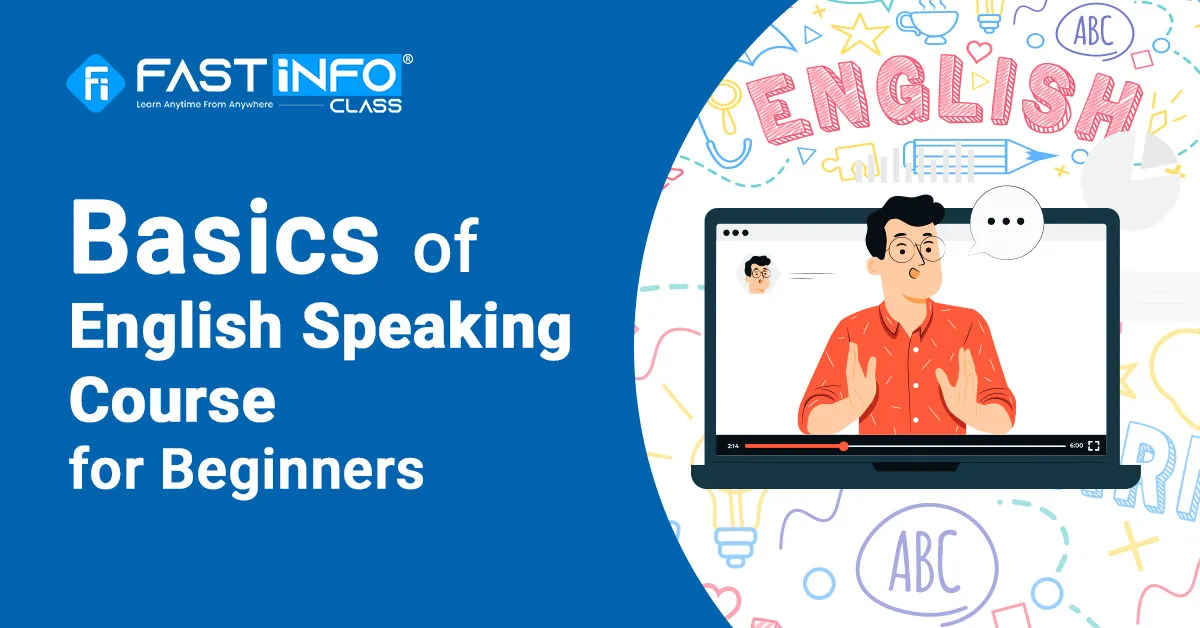Importance of Learning Spoken and Written English
26 Feb, 2025

 By FastInfo Class
Published On 08 Jun 2022
Updated On 05 Feb 2025
Category Spoken English Class
By FastInfo Class
Published On 08 Jun 2022
Updated On 05 Feb 2025
Category Spoken English Class
There are a variety of approaches to learning a language rapidly and effectively. It's not about having a natural talent for languages or enrolling in the most costly course; instead, it's about developing the correct language learning mentality and dedicating time and effort to your studies. Rather than telling you how to learn a new language in three months, we'll provide you with diverse, highly adaptable tactics that will lead to success. Apart from this you can also take spoken English lessons that will help you increase your knowledge of the language.
Do you want pleasant conversations regularly? Read the news? Making new acquaintances? Give a stirring speech, write a fantastic novel, or pass through society as a native speaker?
Try to think about these goals in terms of your four key language skills - listening, speaking, reading, and writing - and linguistic activities. All these four skills can be brushed up in one of the best English speaking classes.
Most learners who can study their language full-time for three months can definitely aim to navigate everyday communications successfully. They can comprehend the majority of what they hear, express themselves clearly in simple words, and can even engage with media like TV and newspaper.
Every learner and circumstance is unique. What matters is that you remain focused on your objectives, practice your language everyday, and follow the method that works for you as an individual learner.
Beginners should not be afraid of mispronouncing words or seeming unpolished. It is important that they begin practising immediately, aloud. There are several spoken English classes for beginners that help in improving their weaknesses in English.
New language learners should aim for phrases such as "bathroom where?" to help them speak about their fundamental needs. It’s not very expressive, but it is comprehensible.
People should focus on acquiring fundamental vocabulary and phrases first, rather than worrying about learning grammar rules only. These can be completed later.
The Internet, particularly video chats like Skype, is one of today's top language learning tools. An English speaker in India can easily acquire spoken English lessons from online tutors anywhere in India using electronic devices.
Another way to immerse yourself in a foreign language is to listen to the radio from a country where the language is spoken.
Beginners can write out a short introduction and then work on translating it with a native speaker. This practice teaches a lot of basic vocabulary and phrases in a short amount of time.
Get enrolled in one of the best English speaking classes as you will receive personalised feedback which is the most crucial thing to have in learning foreign English.
People who are prepared to learn a foreign language full-time can reach an advanced level in just a few months. You can acquire the same level in a year or two by practising one or two hours everyday.
The problem that most beginners face is that they become so concentrated on achieving a perfect end-stage that they feel discouraged and never go beyond the early stages. Don’t try to be perfect so much, get comfortable with making mistakes because you will learn from your mistakes only and then get perfection.
The answer is that it can take three months to one year to learn how to speak, write and read in a foreign language fluently.
Factors that decide how long it takes to master a foreign language
What degree of fluency, or proficiency, are you aiming for? Perhaps you simply wish to improve your spoken English, or you're preparing for a future profession overseas.
Perhaps you're a casual polyglot who dabbles in new languages while concentrating on the fundamentals. You might aspire to be a fluent ex-pat in the future. Every language student has their own objectives and ambitions, and knowing yours will help you estimate the time required accurately. If you join a spoken English class for beginners, it means that you need to get some basic lessons to make your English strong from the start.
In several areas, such as language learning, transferable skills can help you learn closely related skills more quickly.
Mutual intelligibility is a linguistic notion that makes it easier to learn or recognise closely related languages and dialects. For example, if you put in the 1100 hours required to learn Hindi, you may learn Gujarati and Urdu, two closely related languages, in a fraction of that time.
Other factors that determine the time needed to learn a foreign language include your exposure to the foreign language and your past exposure to the language within your circle of family and friends.
Having an excellent language teacher, whether in spoken English classes for beginners or one-on-one coaching, will greatly accelerate your learning. Using learning materials such as books, games, and mobile apps on a regular basis will also help you grow faster.
You can learn the language of your host nation either slowly and steadily through self-study or quickly and furiously with the expert assistance of one of the best English speaking classes. Keep your goals and ultimate purpose in mind at all times. If you are looking for online spoken English classes, then join our FastInfo Class and learn English with a foreign accent in just three months.

Importance of Learning Spoken and Written English
26 Feb, 2025

Smart English Conversation Tips for Beginners
26 Feb, 2025

How to Learn English Fast: 10 Effective Tips
14 Feb, 2025

What is the Importance of English in Corporates?
13 Feb, 2025

How to Improve English Listening Skills: 12 Tips
13 Feb, 2025

Daily English Conversation Practice for Beginners: 50 Useful Topics
29 Jun, 2023

Must Read Novels to Improve English for Beginners to Advanced
21 Feb, 2023

Top 15 Spoken English Books to Enhance Your Fluency
09 Sep, 2023

English Speaking Course for Beginners - Everything you must know
22 Sep, 2021
.webp)
What are the Benefits of Speaking English Fluently?
27 May, 2021